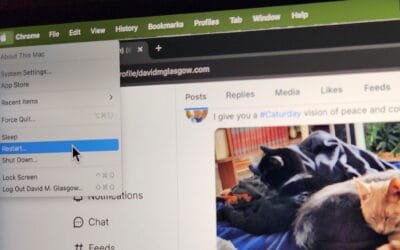“I think prejudice is the stupidest thing on the planet,” said comedian Lewis Black many years ago. “There are so many perfectly valid reasons to hate people on an individual basis.”* And I’ll be the first to admit that there are some self-absorbed, attention-craving, energy-sapping, validation-seeking, conversation-sabotaging, advantage-taking, smelly-food-eating individuals on the planet** whose inherent worth and dignity I find it difficult to recall over the course of routine interactions. But cataloguing the individual shortcomings of others (not to discount the puerile delight it brings me) is a pretty inefficient way to wreak discord among humanity, especially when compared to the crystalline phenomenon known to grammarians as the “substantive adjective.”
We use them every day—and no, they’re not all bad. It really is convenient to refer to “greens” rather than rambling on about “plant-based foods high in fiber, vitamins, and minerals, whose chloroplasts tend to give them a green color when fresh.” But recently (yeah, I’m slow) I’ve started to notice how easy it is to pretend the adjective we’ve “substantivized” is the only important characteristic of whatever it is we’re describing. (It’s this tendency that’s gently lampooned by dining-room comedians who order mint ice cream so they can say they’re “eating their greens.”)
I noticed it first, I think, when a colleague I’d enjoyed working with for a long time made an offhand remark indicating that she felt differently than I did about some hot-button issue or another. Intellectually, I knew that this new factoid was simply something “else” I knew about her—a drop in the bucket of her identity—but I spent a surprising amount of mental energy trying not to let all that I knew (and liked) about her plummet into a bottomless pit of otherness: “Oh, she’s one of those? Horror!”
So not too long ago I did something that, frankly, I was a little ashamed of. I took the politician magnets off my car.
The shame, I think, came from the same part of me that had been afraid to put the magnets on the car to begin with. My personal political leanings aren’t necessarily the most popular ones in the neighborhoods I spend most of my time in, so it felt like a real act of courage to make a public statement in support of, let’s say, Pat Spinnet, the frontrunning candidate for the Pianistarian Party. “There are bound to be other Pianistarians out there,” I reasoned, “and they need to know they’re not alone.
“And furthermore,” continued the voice in my head, “I’m such an intelligent, compassionate, well-respected individual that when people see my ‘Spinnet For Leader’ bumper sticker, they’ll know that Candidate Spinnet is worth voting for, and they’ll rethink whatever other, less enlightened vote they had intended on casting.”
In other words, I had created a narrative in which anyone whose gaze fell upon the rear panel of my vehicle would be compelled to embrace the ideals of progressive theology, eradicate income inequality, eschew racism…. You know, before the light turned.
But that’s not how these things work.
During the last presidential election I volunteered for a particular candidate, visiting voters who had sympathetic voting histories and encouraging them to make it to the polls. I signed up so I could feel like I was doing my part for democracy. But instead, I felt kinda slimy: why were we only encouraging some residents to vote?
In the previous presidential election, I had volunteered for a nonpartisan organization who worked to make sure that all citizens knew their rights and had an opportunity to vote. True, the organization sent us volunteers to neighborhoods where voter suppression was statistically higher—and true, higher voter turnout does tend to favor a particular demographic at the expense of another. But there was a universality, a welcoming, to my work with Election Protection that gave me a sense of integrity, of justice, and (don’t let this get out) deep patriotism—and I missed all of that when I campaigned for Candidate X.
Now, I’ve done a little bit of research on the candidates, and I do have my favorites, of course. And in conversations with people I know (and yes, this includes friends of my personal Facebook page) I’m not terribly hesitant to express very specific political views. But campaign bumper stickers, yard signs, and the like are a bit like political “drive-bys”: we throw out our own beliefs in a way that prevents feedback, insisting that others agree or disagree, subscribe or reject, identify or repudiate. There’s no room for nuance, no opportunity for conversation, no chance of reconciliation; we’re forced to label each other substantively as “Republican” or “Democrat,” “Conservative” or “Liberal,” “Friend” or “Foe.” (Remember that “green” mint ice cream?)
There’s too much hate in this world. And hurling epithets at one another is worse than useless at solving that. What would the world start to look like if, instead of seeing nothing but red and blue (and whatever) T‑shirts and bumper stickers, we took the time to see the frightened, lovable human beings hiding behind them?
*Or words to this effect. It’s been a while.
**Not you, dear. You’re perfect.





0 Comments